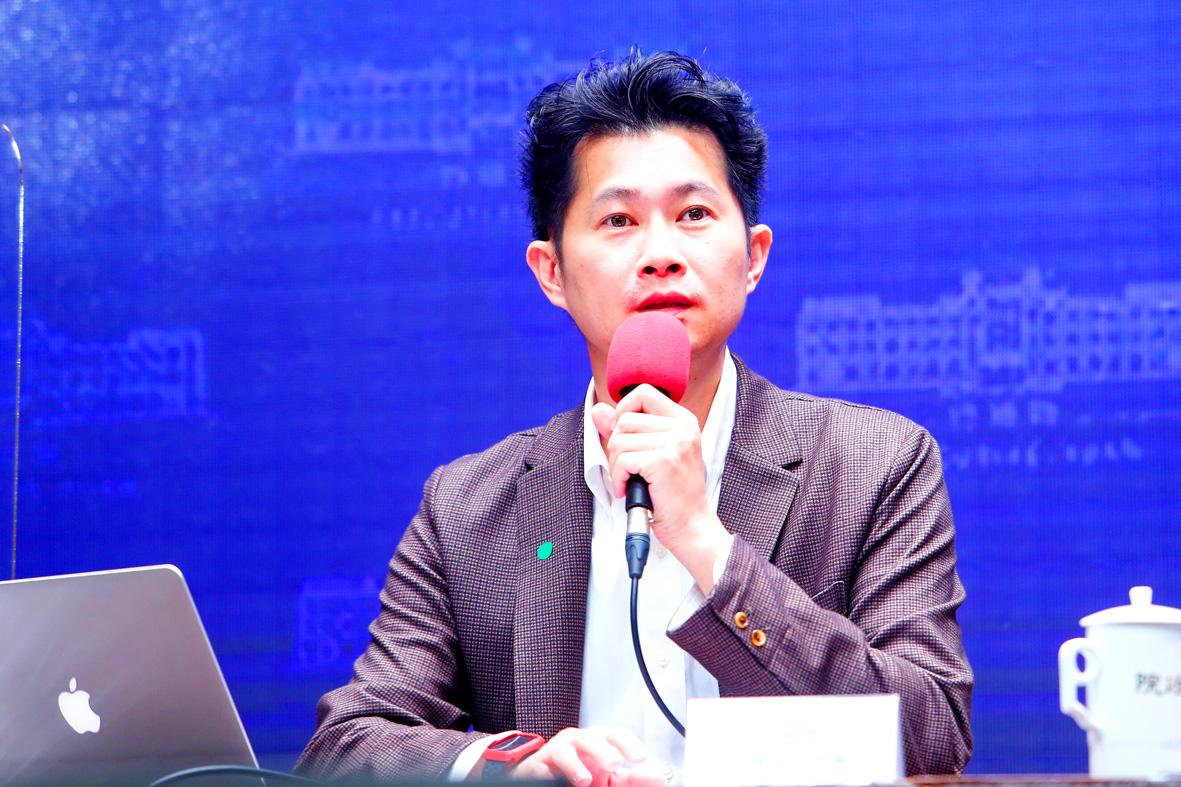Maximum spending on the second phase of the Cabinet’s Forward-looking Infrastructure Development Program was set at NT$510 billion (US$17.24 billion) after the Legislative Yuan yesterday approved a funds ceiling, which was bolstered by NT$90 billion left over from the first phase.
Premier Su Tseng-chang (蘇貞昌) said at the Executive Yuan in Taipei that ministries should comply with requests from the National Development Council (NDC), the Directorate-General of Budgeting, Accounting and Statistics (DGBAS) and others to complete a detailed financial plan by the middle of this month.
The program, initiated on July 7, 2017, is to facilitate infrastructure for transportation, hydraulic engineering, green energy, smart technology, balancing advancements in urban and rural areas, as well as improved facilities for raising children, food safety and fostering talent, the NDC Web site says.

Photo: CNA
Ministries should be careful about budget allocations, and improve collaboration and mutual understanding, Su said.
The first phase of the project was given NT$420 billion from September 2017 to August next year, but NT$90 billion is yet to be allocated.
According to the Special Act on the Forward-looking Infrastructure Development Program (前瞻基礎建設特別條例), funding for the second phase should only be allotted after a legislative review, and should not exceed the ceiling or scale of the first phase.
In related news, Su said that he instructed the Ministry of Economic Affairs to accelerate the introduction of 5G networking and adoption of artificial intelligence systems.
The ministry briefed Su on its plans to make Taiwan a hub for advanced manufacturing and semiconductor engineering.
Service providers this week announced the commencement of 5G services in Taiwan.
If the nation becomes self-sufficient in semiconductor production, and research and development of related technology, it could become a major link in the global supply chain, which would increase incentives for foreign investment and bolster firms’ competitiveness, Su said.
The local semiconductor industry should seek to be self-sufficient in materials production, and in research and development of technology and equipment, he said.
The output value of the nation’s semiconductor industry last year was NT$2.7 trillion, the second-highest globally, the ministry said.
Last year, demand for semiconductor equipment in Taiwan was valued at NT$513 billion, or 28 percent of global demand, while demand for semiconductor products was NT$330.6 billion, or 22 percent of global demand, the ministry said.
It pledged to enlarge the nation’s semiconductor manufacturing capabilities and to attract more foreign investment to the industry.
It is optimistic that the value of the Taiwanese semiconductor industry would be NT$5 trillion by 2030 once it has achieved complete self-sufficiency, the ministry said.
Additional reporting by CNA

Taiwanese scientists have engineered plants that can capture about 50 percent more carbon dioxide and produce more than twice as many seeds as unmodified plants, a breakthrough they hope could one day help mitigate global warming and grow more food staples such as rice. If applied to major food crops, the new system could cut carbon emissions and raise yields “without additional equipment or labor costs,” Academia Sinica researcher and lead author the study Lu Kuan-jen (呂冠箴) said. Academia Sinica president James Liao (廖俊智) said that as humans emit 9.6 billion tonnes of carbon dioxide compared with the 220 billion tonnes absorbed

The Taipei Mass Rapid Transit (MRT) Wanda-Zhonghe Line is 81.7 percent complete, with public opening targeted for the end of 2027, New Taipei City Mayor Hou You-yi (侯友宜) said today. Surrounding roads are to be open to the public by the end of next year, Hou said during an inspection of construction progress. The 9.5km line, featuring nine underground stations and one depot, is expected to connect Chiang Kai-shek Memorial Hall Station to Chukuang Station in New Taipei City’s Jhonghe District (中和). All 18 tunnels for the line are complete, while the main structures of the stations and depot are mostly finished, he

Taipei is to implement widespread road closures around Taipei 101 on Friday to make way for large crowds during the Double Ten National Day celebration, the Taipei Department of Transportation said. A four-minute fireworks display is to be launched from the skyscraper, along with a performance by 500 drones flying in formation above the nearby Nanshan A21 site, starting at 10pm. Vehicle restrictions would occur in phases, they said. From 5pm to 9pm, inner lanes of Songshou Road between Taipei City Hall and Taipei 101 are to be closed, with only the outer lanes remaining open. Between 9pm and 9:40pm, the section is

China’s plan to deploy a new hypersonic ballistic missile at a Chinese People’s Liberation Army Rocket Force (PLARF) base near Taiwan likely targets US airbases and ships in the western Pacific, but it would also present new threats to Taiwan, defense experts said. The New York Times — citing a US Department of Defense report from last year on China’s military power — on Monday reported in an article titled “The missiles threatening Taiwan” that China has stockpiled 3,500 missiles, 1.5 times more than four years earlier. Although it is unclear how many of those missiles were targeting Taiwan, the newspaper reported